
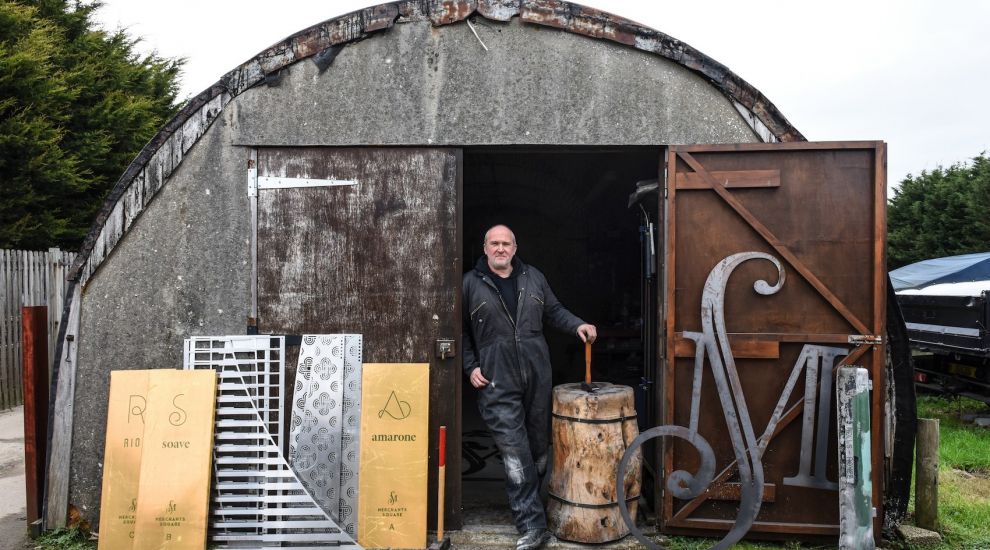

At face value, metalwork and art may appear to be at two opposite ends of the spectrum. Metalwork is perceived as a heavy-handed, loud and almost aggressive process, whilst the creation of artwork is viewed as being delicate, well thought-out and precise.
From his St. Lawrence studio, Neil McKenzie runs ‘Art Metal’, which specialises in the restoration of original hand-formed aluminium automotive bodywork, bespoke creations, replica projects and custom-part fabrication.
It is from the same studio that Neil also creates his artwork — many of which locals will recognise as part of new developments springing up across the island.
Neil explains that the skills required to be an artist are not dissimilar to those required to excel in the metalworking trade, as Emily Moore reports.
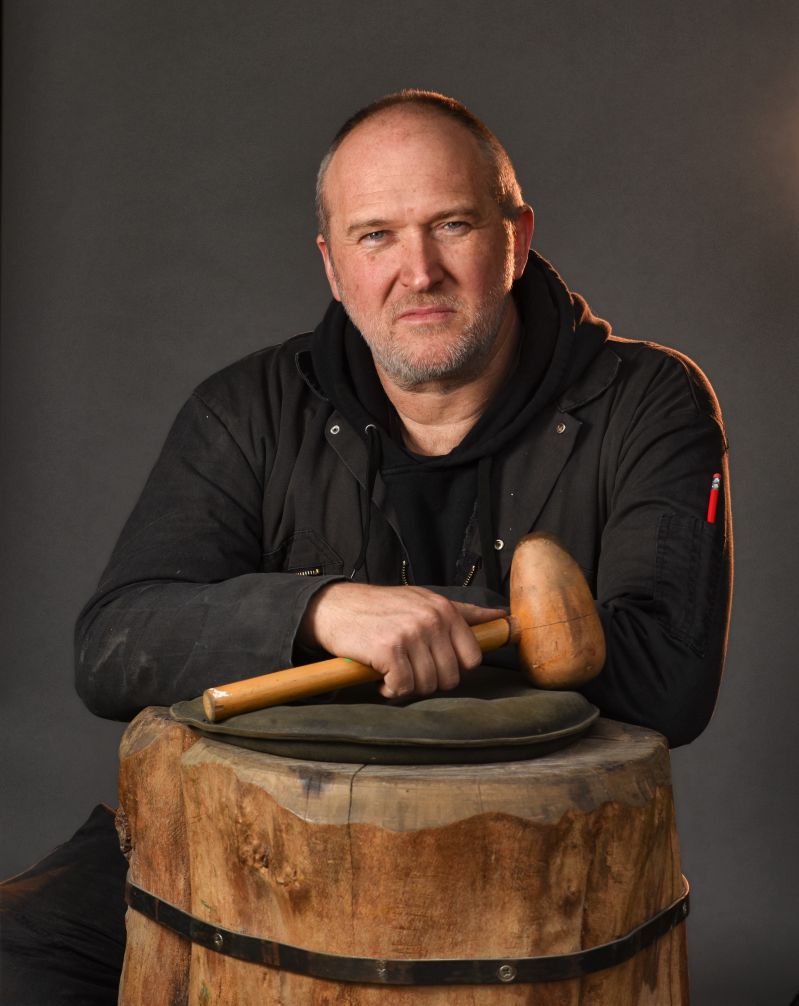
Pictured: Art Metal founder and owner, Neil McKenzie.
If you have seen the 2018 film Driven, then the below plot may sound rather familiar.
A fledgling sports-car company starts to find its feet and gain the support of celebrities including television hosts and a member of the Rat Pack, and then the company owner is arrested for allegedly possessing millions of dollars-worth of cocaine.
He is later cleared of all charges and judged to have been a victim of FBI entrapment but the incident still brings the Belfast-based DeLorean factory to an early death.
And that could have been the end of the DeLorean story – a flash-in-the-pan success which burnt out too soon – but for the fact that the car became an icon of the 1980s and was immortalised forever in the 1989 sci-fi classic Back To The Future.
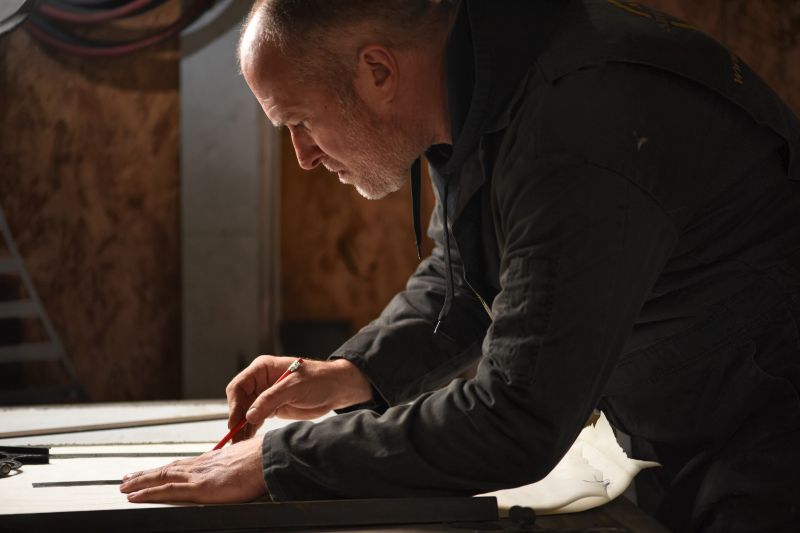
Pictured: Neil explains that the skills required to be an artist are not dissimilar to those required to excel in the metalworking trade.
With its unique construction and the associated scandal and romance, it also caught the attention of internationally renowned Irish artist Sean Lynch.
“Sean and I became friends during the 19 years that I lived in Ireland,” explained Art Metal founder and owner Neil McKenzie, who collaborated with the artist on a DeLorean-inspired project which he exhibited at La Biennale di Venezia, a global celebration of art and architecture, which takes place every two years.
“It’s an unusual story,” said Neil. “Sean’s art is very much based on process. His imagination was captured not just by the story of John DeLorean but on what happened when the factory closed.
“Under EU law, replacement parts for vehicles should still be available for a certain number of years after production of a car ends but, in this case, everything disappeared overnight, with parts later turning up at scrapyards.
“The original plan was to make new panels using the original pressing dies but when he tracked down the dies, many of them were being used as anchors for salmon nets off the west coast of Ireland. A diver went down and photographed them, and there was such a vast ecosystem living in them that it seemed wrong to bring them up.”
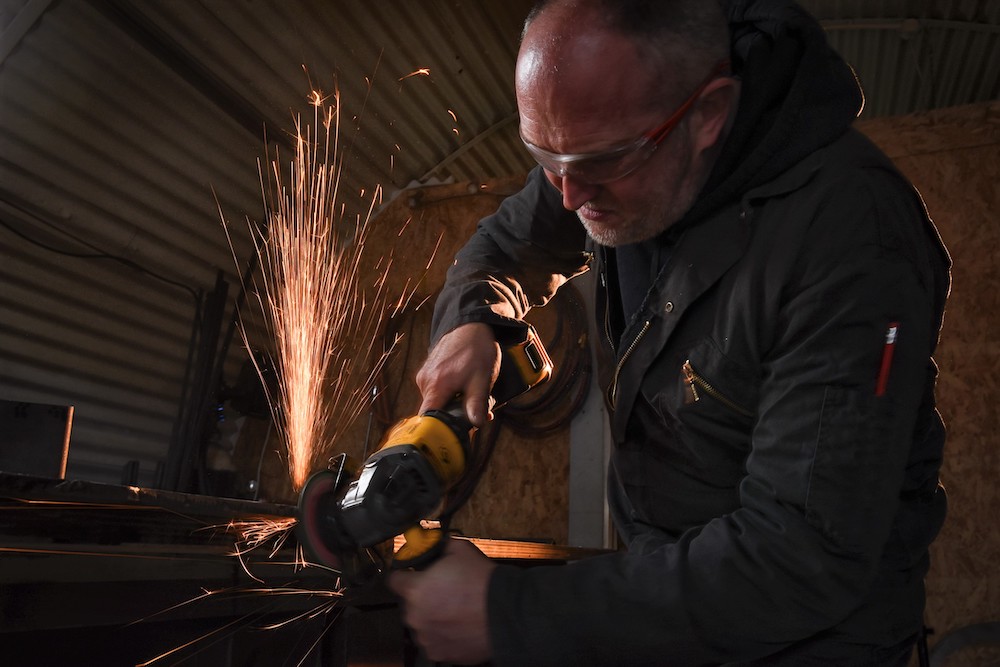
Pictured: Neil McKenzie collaborated with renowned Irish artist Sean Lynch on a DeLorean-inspired project, which he exhibited at La Biennale di Venezi.
Undeterred by this setback, though, Sean and Neil pressed on with their project, recreating each panel of the original DeLorean and constructing a model replica of the iconic car.
“At the time, I had just set up my own business in Ireland and when Sean phoned me and said he wanted to build a DeLorean, I didn’t take him seriously,” said Neil.
“Looking back, though, it was a hugely exciting project to be involved with and the one which really took me from working with metal to producing metal artwork.”
Indeed, before this career-changing phone call, Neil’s experience had been primarily in panel-beating and vehicle restoration.
“I had no idea what I wanted to do when I left school, so I started out as an apprentice panel beater, repairing cars,” he said. “It was slightly ironic as I had no real interest in cars but it was still an interesting job.”
From there, Neil went from repairing modern vehicles to restoring classic cars with a move to Le Riche Automobile Restorers.
“I worked there for about 11 years and that was really interesting because, with Jersey being such a wealthy island, you work on some really beautiful and exotic vehicles. In fact, you become so immersed in what you’re doing that it isn’t until you move away, that you realise just how special some of these things are,” he said.
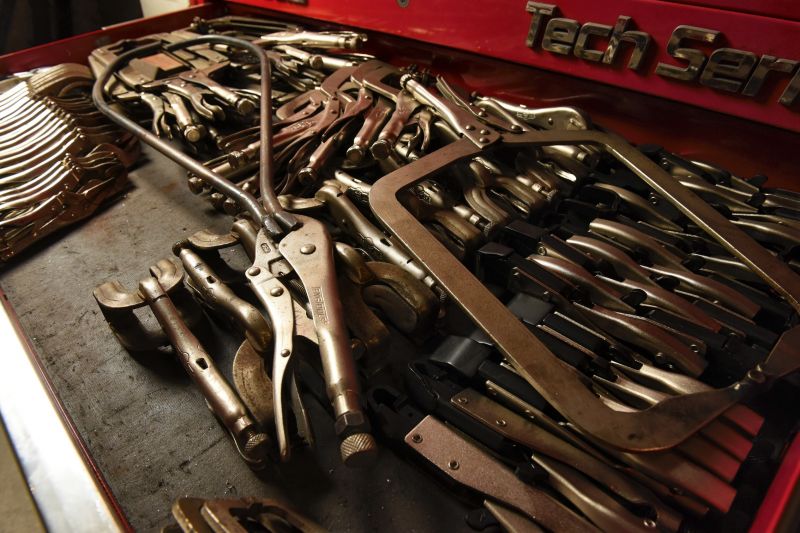
Pictured: Neil went from repairing modern vehicles to restoring classic cars.
His decision to leave Jersey and head to the Emerald Isle came just before a milestone birthday.
“I left Jersey on my 30th birthday,” he smiled.
But while the change of scenery was initially kind to him, the global recession of 2008 brought about a change in his fortunes.
“For the first five years in Ireland, I worked in Dublin at Bushy Park Ironworks, and it was one of the best jobs ever,” he reflected.
“We worked in a forge environment and there was a strong focus on traditional blacksmithing but also heritage restoration work and bespoke projects.
“Their policy was that if their employees did the job well, they would make the company more money, so they really invested in staff training and development. It was almost like being at college for five years but getting paid for it.”
It was that role which Neil says really “opened my eyes” to the metalworking trade.
“I’d had a taste of it at Le Riche because working on the classic cars gave me an insight into real craftsmanship, but Bushy Park gave me my first opportunity to be a bit more creative,” he said.
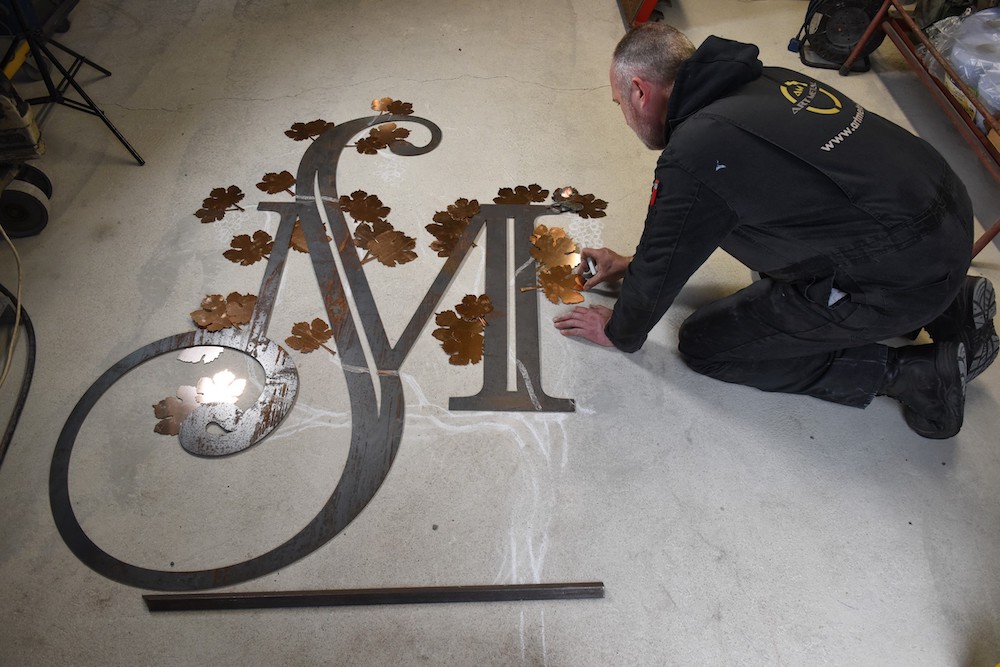
Pictured: Having decided that his future lay in combining metalwork with art, Neil launched his own business.
Having decided that his future lay in combining metalwork with art, Neil launched his own business. However, with the country plagued by the Celtic Tiger crash, he soon discovered that there was little demand for his offer.
When he returned to Jersey, after a year in the New Forest, he realised that the local market was very different and, after taking a few months to find his feet, he decided to take the plunge and go into business again.
“When you look back at life, there are so many key moments when someone you meet or something you do has a key impact on what happens next,” he said.
“While being in business requires skill and acumen, there is also an element of luck involved. Ireland wasn’t the right place or the right time for a metalworking business but I took the lessons I had learnt from that experience and launched Art Metal in 2015.”
And his first commission was one which took him – almost literally – into another world.
“I was approached by Anne Cleary and Denis Connolly to create a series of metaperceptual helmets, designed to reflect the ways in which animals see the world,” he recalled.
“They came up with the designs and I built the helmets, which were exhibited in the Tate Modern beore featuring at events around the UK, Ireland, France and Germany.”
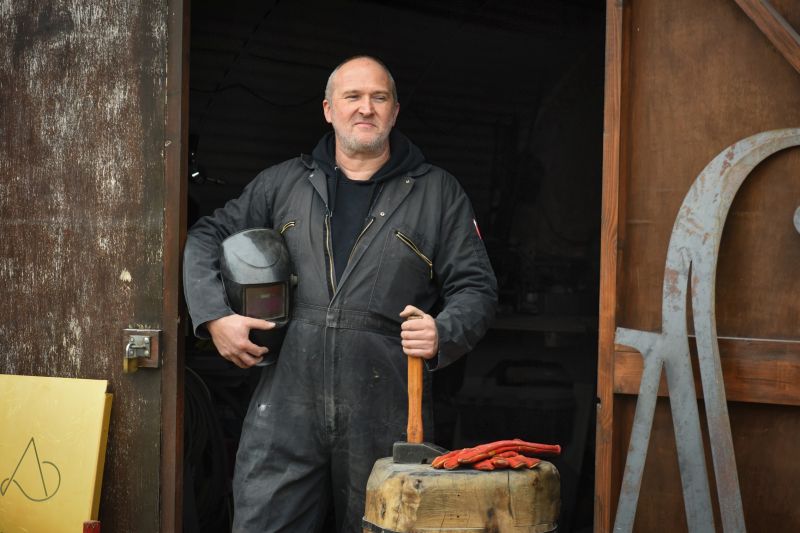
Pictured: Neil creates his work from his St. Lawrence Nissen-hut studio.
While the helmets and the DeLorean have taken Neil’s work around the world, islanders will also be familiar with many of the works which leave his St. Lawrence Nissen-hut studio.
“Having started with private commissions, I have since become involved with a number of construction projects, supporting the Percentage for Art element of developments,” he said.
“Working with art advisers, architects and designers has introduced a new type of work to Art Metal and has given me the opportunity to collaborate with different professionals, which has been great.”
Among the Percentage for Art schemes which Neil has created are the giant picture frame at the new Westview development and the six-metre-wide feature wall at Samarés Nurseries.
“The wall is designed to reflect the history of the area,” he said.
“When they started excavating the site, they found evidence that Neolithic families had lived in the area. There were no finds of significant historical interest but it was still worth depicting this period. Apparently, Samarés means salt marsh and so I chose aluminium panels to represent the salt crystals, while the stainless steel panel adorned with handprints is representative of the cave men who once lived here.
“As they also found limpet pits during the excavation, I bribed my daughters with the promise of ice cream if they collected limpet shells for me, and these feature in a wave effect – reminiscent of the Op-art style of Bridget Riley – on the wall.”
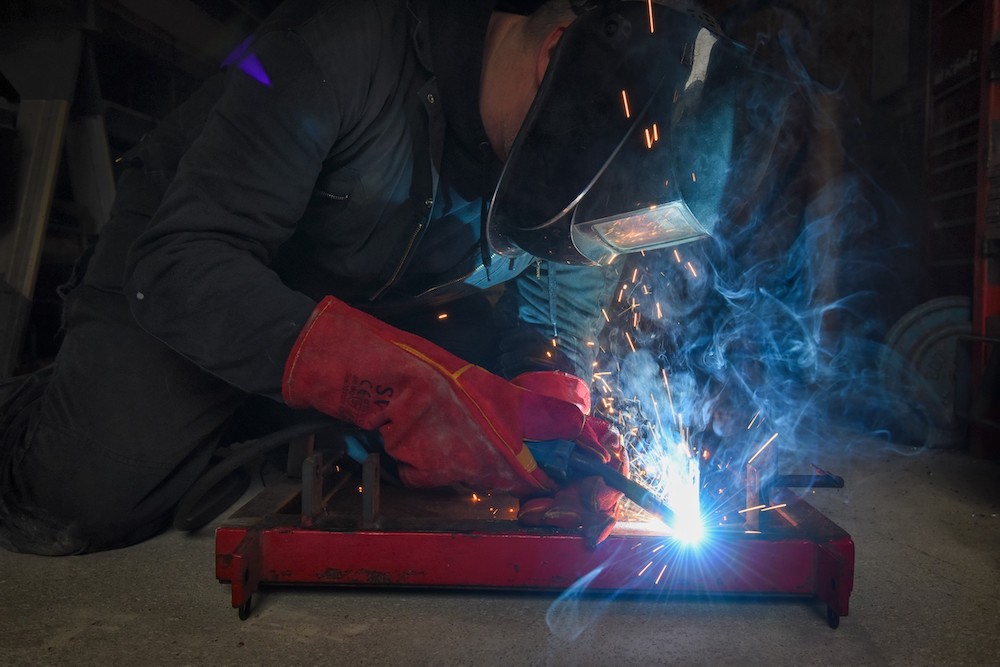
Pictured: “Working with art advisers, architects and designers has introduced a new type of work to Art Metal."
With the Westview picture frame having recently been installed and the tree-themed doorway at Bella Rocca also now in situ, Neil’s workshop currently features backlit panels and metal vineyard-inspired logos for Le Masurier’s Merchant Square development in Bath Street.
“The logo has been created from COR-TEN steel and will be built up and placed on a plinth,” he explained. “Having been asked to reflect a vineyard in the design, the logo will also feature bunches of grapes and leaves, which have been laser cut from a digital file which I drew, and will then be finished by hand to create the right textures and layers.”
With his inspiration coming from “anywhere”, Neil admits that it can be difficult to switch off.
“My workshop is on the flight path and watching the planes coming over can trigger ideas, as can going out for a walk,” he said.
“Nature is a great place to be and it’s often when you’re out walking that you have the time and space to think about your projects.
“When you think about it, there is design in absolutely everything and every single item, from your coffee cup to the lamp in your lounge, has been touched by the hand of an artist or a designer. Because of that, any object can provide inspiration.”
This combination of constant inspiration and being a sole trader means that Neil’s job is definitely not one that starts at 9am and finishes at 5pm.
“It’s definitely not your average day job,” he smiled.
“I tend to start at about 6am and stay until whatever time suits the job I’m doing at the time. When a deadline approaches, it’s not unheard of for me to work 35 hours in two days. Those periods are intense but they’re also quite enjoyable – particularly once they’re over and you can look back on what you’ve achieved with slightly fonder memories.”
READ MORE...
This article first appeared in Connect Magazine, which you can read in full below...
Comments
Comments on this story express the views of the commentator only, not Bailiwick Publishing. We are unable to guarantee the accuracy of any of those comments.